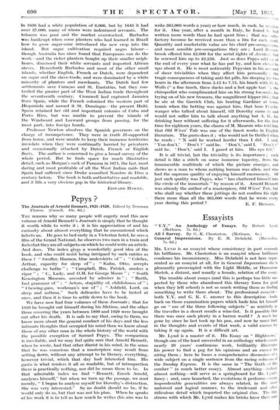Essayists
MR. LYND is an essayist whose consistency in part conceals his brilliance. Mr. Chesterton is an essayist whose brilliance condones his inconsistency. Miss Delafield is not here repre- sented as an essayist at all, for in General Impressions she is pleasantly preoccupied with the Light Middle, or Humorous Sketch, a distant, and usually a female, relation of the essay.
The trouble about essays (and this is perhaps too little sus- pected by those who abandoned this literary form for good when they left school) is not so much writing them as finding something to write them about. The professional essayist— both Y.Y. and G. K. C. answer to this description—looks back on those examination papers which bade him let himself go on "one of the three following subjects" as wistfully as the traveller in a desert recalls a wine-list. Is it possible that there was once such plenty in a barren world ? A week has gone by since he last took up his pen, and now he must find, in the thoughts and events of that week, a valid excuse for taking it up again. It is a difficult art.
Mr. Lynd is a master of it. His Essay on " Highbrows," though one of the least successful in an anthology which covers nearly 20 years' continuous work, brilliantly illustrates his power to find a peg for his opinions and an excuse for airing them ; here he bases a comprehensive discussion of a wide subject on a single sentence from the racing columns of the Sunday Express. It is the same in "The Sixth of De. ,cember " (a much better essay). Almost anything—indeed almost nothing—will serve as a springboard for Mr. Lynd s fancy ; and, once launched, the evolutions it performs among imponderable generalities are always related, in the most unforced and logical manner, to the irrelevant and often ridiculous detail which imparted the original élan. The tiny straws with which Mr. Lynd makes, jxis bricks have their own
discernible part, and are not submerged, in the design of the finished product.
Technically, Mt. Lynd and Mr. Chesterton offer interesting contrasts. Mr. Lynd always comes full circle. If it was a small thing that led him to the consideration of great things (like the beans that made him meditate on frustration), he brings us back in the end to the small thing and relates the great things to it. Mr. Chesterton, too, does this as a rule ; but he does it less naturally. He makes for the heights at once ; both his thought and his language seem to be wearing seven-league boots, and when in the end he comes down to earth again his last paragraph is more like a spent rocket-stick than a mile-stone which has been in sight all the time.
Neither author ties himself to the topical ; in both cases we could tell the decade in which each essay was written, but not (except occasionally with Mr. Chesterton) the year. Mr. Lynd does not do more than glance at the larger topics of the day, knowing that they will be dealt with in the editorial columns of that weekly paper to which he has contributed with such terrifying regularity. It is around the smaller follies, triumphs, and accidents of the age that his, and most of Mr. Chesterton's, essays are written.
Mr. Chesterton's style we all know, and most of us like. As a medium for writing essays in it is open to the perhaps rather finical criticism that—taken in large doses—it makes all his truths sound like half-truths. Sound and sense, we feel, cannot be yoked as Mr Chesterton yokes them without one of them suffering ; and since sound never seems to be the one, we have an uneasy suspicion that Mr. Chesterton's allegiance to alliteration and antithesis is stronger than the desire to say exactly what he meant. Analysis, however, almost always proves this suspicion unwarranted.
Mr. Lynd's style is fine and equable, like his temper. He appears to be ambling, but he covers a great deal of ground. To make us think, he does not let off fireworks under our nose ; his lucid, mellow writing is entirely devoid of tricks and tours de force. He delivers the matter of epigrams in the least epigrammatic of manners; he does not raise his voice
because he has a good thing to say, and when in his pal!res „e come upon a memorable piece of wisdom (as, for ex., inpie, "there is no great happiness without opposition execpt for children ") we recognize it the more certainly for
flamboyant utterance.
The essays of Mr. Lynd and Mr. Chesterton are perhaps the best modern products of their kind. Miss Delafield is also, in her own way, good. Human but a little acid, perceptiN e but deliberately superficial, she bowls at nine-pins which have been upset before—Dentists, and the Modern Novel, and so on—. and the downfall of each she brings about by attractively individual methods ; so that although we know that these things have been done before, and sometimes better, we feel that they have never been done in quite this way, and there- fore that—in most cases—they were worth doing. Far the best things in the book are the semi-serious character-sketches at the end.

































 Previous page
Previous page